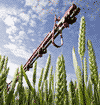Hazard-based pesticide approvals system fraught with danger, says government adviser

Moving pesticides approvals from a risk- to hazard-based system is fraught with danger, John Beddington, the government’s chief scientific adviser, told food chain industry representatives ahead of a crucial vote by the European Parliament’s Environment Committee in Brussels tomorrow (5 November) on proposed legislation.
He said an integrated approach would be needed to meet the challenges in the next 20 years from an ever-increasing global population. “Agriculture will need to produce 50% more food on less land, using less water and energy and with fewer fertilisers and pesticides. No pressure then,” he said.
But crop protection was one way of mitigating against the 25-30% of global production that was lost pre-harvest and the 25% lost post-harvest, he said. “Mitigating against weeds, pests and diseases is very important.”
In that context the proposed EU pesticides approvals legislation was frightening, he said. “The move to a hazard-based system has the implication that many products would be lost.”
How many would depend on the detail, but he pointed to the potential loss of triazole fungicides for the control of wheat diseases and products used during potato storage as two possible losses.
“The move from risk to hazard is fraught with danger,” he warned. “It is essential to have a reasonable science-based assessment. Quite how these proposals have come through, I just don’t know.”
Members of the European Parliament’s Environment committee vote on amendments to the common position agreed between the European Commission and agriculture ministers of the 27 EU countries tomorrow [5 November].
Those amendments are likely to include proposals that will increase the number of pesticides falling foul of the new directive.
In October, Farmers Weekly sent an in-depth synopsis of its Save our Sprays campaign, which has highlighted the potential damage this legislation could cause all sectors of arable cropping, to 135 MEPs who sit on the influential environment committee, as well as to the European Commission and the farm council.

